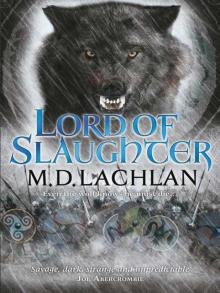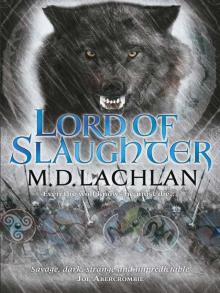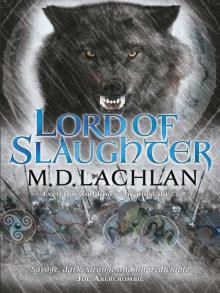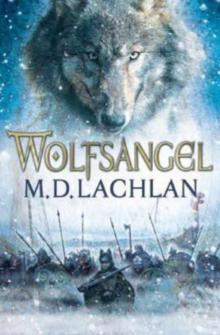- Home
- M. D. Lachlan
Lord of Slaughter c-3 Page 2
Lord of Slaughter c-3 Read online
Page 2
‘It’s the battle fetter,’ he had said. ‘It strikes the best of warriors. It’s a gift. Only Odin can impose it. He’s saving you for something special. He won’t let you waste yourself in a pointless scrap with a man twice your size. You will grow and you will become mighty, believe me.’
Snake in the Eye shifted on his pillow and touched the stone he wore at his neck on a thong of leather, asking it for luck — blood luck, fine enemies and glory kills. It was not an expensive piece of jewellery, just a triangular pebble marked with the head of a wolf. His grandfather had owned it, an amulet for the blessing of the gods, and his mother gave it to Snake in the Eye when the boy was five. He’d worn it ever since.
A slinking shame crawled through his mind when he thought of his grandfather, Thiorek, son of Thetmar. Sometimes called the fat warrior, he had killed so many men it was said ravens followed him where ever he went and fell from the skies they became so fat. But his grandfather had been a head taller than other men by his thirteenth year. Snake in the Eye was short for his age, his stature slight, and his skin was like a girl’s.
He would kill, he would kill. Not soon, though. The Armenians had fled or died — at least the ones who fought for the rebel — the Normans and the Turks too; the camels had run and the Greeks lay bleeding. In Constantinople, he thought, Miklagard, the world city, he would find his cure. There he would throw off the battle fetter.
He tried to sleep but his mind was wild with memories and fantasies. He remembered the mad delight that had followed the victory, recalled the coming of the rain — rain, said the Greeks, like Noah saw. Snake in the Eye knew that story, he had been at many campfires and heard tales from all over the world. Looking up at the wet cloth of the tent, he had the idea he had called the rain himself, to blot out his shame.
The images and sensations of the day played out again and again in his thoughts and eventually began to fade, as if his mind was heavy with blood and torpid like a gorged leech. Snake in the Eye dreamed of a rain-black night and a field of the slain where a wolf came nosing towards where he lay.
Then the wolf was at the tent and it had never been a wolf — just the idea of a wolf, an idea you could catch by looking at it. It was a man. The rain-blind guard at the tent’s rear was taken down in silence, his neck broken. The killer drew a sword that shone even in the dream’s dark night like the cold crescent of the moon tumbled to earth, a wicked talon of silver, a razor curve shaped and sharpened by death.
Snake in the Eye stirred, opened his eyes and knew his dream was over. Above him was a man who was not a man, a wolf who was not a wolf, and in his hand was a cruel curved sword that the boy sensed was an ancient killer.
His thoughts cleared and, in the brazier’s faint light, he saw standing over the emperor a man wrapped in little more than a wolfskin, which he wore with the head over his own. At first he thought it was a legionary because one of the Greeks had worn the skin of a great cat like that. But this wasn’t a legionary. It was a wild man, stained with mud, his skin dyed grey like a wolf’s, the water dripping from him.
Snake in the Eye shouted and leaped foward. The man caught him with one hand and held him by the throat with a terrible strength. The boy squirmed and choked, desperate fingers unable to prise away the crushing grip.
No one came, the boy’s choking unheard beneath the rush of the rain, the songs of the camp and the screams of the dying.
The emperor woke, his eyes wide with surprise. He gave a snort, almost resigned, more like a man cursing his luck the last wineskin had gone from a market stall than someone about to die.
He looked at the weapon.
‘I am a Roman emperor, born in the purple, friend, so if you are of some conquered people and expect to see me beg, you will be disappointed. You are unwelcome but not unexpected. Do what you have to.’
Snake in the Eye fought against unconsciousness. The tent blurred and the brazier’s light cut trails in front of his eyes. The wolfman released his grip, dropping the boy to the floor. Then he threw his sword at the emperor’s feet and spoke two words in hacking, guttural Greek.
‘Kill me,’ he said.
2
The Lovers
‘I ingest your eyes. I drink your blood. I eat your liver. I put on your skin.’
‘What are you talking about, Loys?’
The young woman propped herself up by one elbow on the bed, gazing down at the man who lay beside her in the dawn light. She nibbled on a little figure of a man made from bread while her companion gently twisted a strand of her long blonde hair between his fingers and gazed up at her, smiling.
‘It’s a charm — I heard it in the market. It’s to make you love me. That’s what the bread people are for. That’s me-’ He tapped his finger on the bread in her hand, ‘and this in my tummy was you.’
‘Idolatry!’
‘It would be if we believed it. As we don’t, it’s just bread.’
‘You don’t need a charm, I already love you.’
‘But you wish you did not, don’t you, Lady Beatrice?’
He drew her to him and kissed her. Then they broke and she turned her eyes from his gaze.
‘I wish I did not.’
‘So serious.’ He took her hand and held it to his mouth.
‘Intemperate love is serious, so the Church tells us,’ she said.
‘It is a woman’s weakness to be governed by unruly passions. But I love you immoderately too and I do not have the excuse of my sex to hide behind.’
‘I had hoped when we married, it might fade and be replaced by proper feelings of charity and tender unity. That’s what’s meant to happen, isn’t it, to good people?’
‘We tried our best. We drank the honey wine at our wedding.’
‘Not enough, maybe. I am in the grip of a vicious love. When you are here, the idea of us parting fills me with a dread like grief. I burn for you.’ The woman’s eyes were wet. He let go of her hair and put his hand to her cheek to comfort her.
‘And I for you. It is regrettable, but we have prayed against it and still it remains.’
‘All holy teaching tells us such desire is base and unworthy of marriage.’
They spoke French, her voice noticeably accented with the harder consonants of the Norman court. His pronunciation was softer, indicative of a more humble upbringing.
‘What would you do if you did not love me?’ he said.
‘Our marriage would be happier. I would sit here with my embroidery, content, not restless and longing for you to come back so much that I sit hating the sunlight and calling the dusk down like a country witch. Or I would have married an equal and still be sitting outside some fine hall, watching the grapes ripen in the sun and my husband work his hawks.’
‘Yet this little room holds more pleasures than all the fields of Francia.’
‘So that was my fortune, to love and to starve.’
‘We are not starving, Bea.’
‘Only while I have my bits of jewels and gold to sell. What if we are robbed again? We need a better place than this, Loys, more secure.’
‘It is secure while you’re here.’
‘Sat on three cheap rings in this wooden hutch like a hen on her eggs. They will never hatch, Loys. I want to go out to see the streets. This is the most marvellous city on earth. I can’t spend all day looking at the four walls.’
‘You’d be exhausted in half an hour.’
‘I’m not as weak as you think I am.’
He sat up on the bed and patted her belly. She was visibly pregnant.
‘You mustn’t wear yourself out. Not with him in here.’
‘Let’s hope it is a him.’
‘Do you really think it would give us the chance to return?’
‘He’d be my father’s only heir. If I can make him vow not to harm you, then, yes, he might accept you. I’m sure you could drag up a noble ancestor from somewhere. You’re of his blood, sort of. Your father came over on the same longships that he did.’
<
br /> ‘Not quite the same. Mine crewed the cargo ship, not a warship.’
‘He has to respect your heritage.’
‘If you have a son.’
‘If I don’t?’
‘Then, when I am established at the university we will live at the court. You’ll be able to move freely there. I’ve offered to hire a eunuch to escort you while I’m not here.’
‘We can’t afford to waste money like that. I wish there was another way for us to live but by studying.’
‘I must work for free until I am offered lodgings and a stipend. You know this — we’ve been over it.’
‘Yes. I’m sorry, I just…’ She turned her face to the wall.
He held her hand. ‘I am a scholar; I can do nothing else. I have no lands; I have no other skill. I will come home as quickly as I can and then I will take you walking by the palace.’
For the first time she smiled.
‘If my father could hear me. My life dependent on a tradesman.’
‘Is a monk a tradesman?’
‘You’re no longer a monk, Loys.’
He kissed her.
‘Whose fault is that? Your father’s people are tradesmen, though they trade as much in blood as furs. If your father could hear you I’d be worried. Do you fancy the idea of him lurking behind the door with his axe?’
He sprang off the bed and tapped the bolt home in the door.
‘A noble man disdains to show fear,’ she said.
‘A scholar checks twice if he wants to keep his head. This place is safer for you than almost anywhere else. Your father won’t look here. I know his mind. It’s impossible for him to even think of you in a place like this.’
‘So why do you check the door?’
‘I know enough of the arts of learning to beware of certainty in all its forms. Your father would not look here. What of chance, though? What if God punishes us for our loving each other rather than him?’
‘Will God punish us?’
Loys put a hand to the mouldy wooden wall of the little room.
‘Perhaps he already has.’
He pulled on a pair of linen under trousers then opened the shutters wide.
The street was filling up with traders setting out their stalls — below a man with a tray of Persian apples, the Greek name for peaches, paraded back and forth. He’d buy her one before he left for the university, he thought, and hope it would please her.
Loys gazed out towards the east, over the vast sea of Constantinople. The sky was dark, rain clouds scarring the sunrise with bands of purple. It was July but the air bore the edge of a chill.
They had two rooms, one for her, one for him, in the Greek way. The woman who rented them to them pointed out that the female chamber, though cramped, was comfortable and light. Bea hadn’t spent a second in it since they’d arrived in the early summer. When at home, they lay together in each other’s arms.
Loys hoped to secure some lodgings at the university before winter. He had no idea how cold it might get in this part of the world but, if it was anything like Normandy, these little rooms would be nowhere near warm enough. The Greeks in the university had told him the winters could be bitter. It was cold in their room that morning and it was July. Beatrice was susceptible to fevers too. In a way he was thankful for that because it was through a fever he had come to know her.
It really did seem like the will of God they were together. She had been ill, consumed with a fever, and he had gone with an ordained monk to see what they could do to help her but expecting to administer the viaticum to commend her soul to heaven.
They had found her very likely to die, terribly agitated and hot, screaming that she should be left alone, not pursued. None of the servants would attend her because they said she was possessed.
Loys was with old Father Paul, a good doctor in his day but who now drank too much wine and was fat and red in the face. He reminded Loys of a big round blood blister and he wondered that his colleague didn’t burst at any minute. They sat with the girl and Paul — whose age and holiness had made the presence of a chaperone unnecessary — actually fell asleep. Loys hated to see Beatrice so sick, not because she would die — plenty died younger — but for the torment she was suffering. He took her hand and told her God was with her and loved her. The gesture calmed her. Loys kept holding her hand, half an eye on Father Paul to see if he woke. He whispered to her: ‘I am at your side and I will not leave you. You won’t die, see, how can you die when I hold you to life so securely?’ He sat like that for an hour before she opened her eyes and asked for a drink. When he fetched her one, she sipped at it, took his hand and lay back to doze some more.
Lord Richard heard she had recovered and came to the chamber. Loys would never forget his grim presence. He was so brusque and short-tempered he seemed a breath away from punching you to the floor even in the moment of his delight. He didn’t thank the monks; just swept into the room, put his hand to Beatrice’s brow and said, ‘Glad to see you sitting up. I knew you were of tough stuff.’ Then he left them.
Even though Beatrice quickly recovered, Loys persuaded Paul they needed to check she didn’t relapse. The lady was troubled by dreams and there was a possibility she was still haunted by demons.
So they went back and heard how in her fever she’d had a dream so vivid it now seemed more like the memory of something real. She was in the woods in the evening and she sensed something far inside the shadow of the trees — more of the darkness than in it. It was as if all the darkness of the world, the shadows of the forest and those that lurked beneath the church gables, the ancient and hungry darks of childhood that brooded beneath beds and in cupboards, that skulked under stairs and in attics, flowed in to the body of the creature that pursued her. Instead of fleeing from it and hiding, she called to it, speaking in a voice it understood — the howl of a wolf in the hills.
Paul simply said she had been frightened by her fever and that she would soon be well again. So it seemed. Beatrice became happy and began to look forward to seeing the monks. With Loys she forgot her dreams. For three visits the fat doctor dozed while Loys and Beatrice laughed and talked. When Loys made an excuse to visit alone, Beatrice always made sure her chaperone was old Marie, so deaf and so in awe of monks that she sat with her face buried in her embroidery, oblivious to the couple flirting. Of course, both knew the danger they faced. As a monk who had taken his vows Loys was not free to marry her, and as a low-born man he was no sort of match for a duke’s daughter.
Loys and Beatrice prayed for their affection to pass and agreed not to see each other. But she knew he collected firewood in the forest on a Wednesday morning and she — who had always loved to go out alone on her horse to greet the dawn — suddenly found it necessary to exercise her horse in those woods at that time — despite the winter cold. They had met, away from chaperones, away from the dozing Paul. She told him what she feared. She saw a man in her dreams who she was convinced meant her harm. She needed to go where he could not find her.
‘He can’t find you in your father’s keep,’ said Loys. ‘He has a hundred warriors to defend you there.’
‘He will find me,’ said Beatrice, ‘because I have seen him. He is here.’
‘Then identify him to your father and that is the end of it,’ said Loys.
‘It won’t do any good,’ said Beatrice. ‘I’m not even sure he is one person or a demon that inhabits many people, as he chooses. He watches me and I know he will not rest until he has me.’
‘Then ask to go to your cousins,’ said Loys.
‘No. I would be with you. I want you to take me away from this place.’
‘I have my vows, lady,’ he said. ‘What will I do if I break them?’
‘I will give you new ones,’ she said, and he understood she was asking him to marry her. He looked into her eyes and knew he bore a passion for her before which his monastic vows, his studies, his security, were pale and insubstantial things, mere candles to the light of the sun. It had led
to where it had to lead — a little room somewhere away from the vengeful gaze of her father and away from the monastery.
Now they were in that little room, in Constantinople, the city chosen because they both knew Greek, he as a serious student, she because there had been a fashion for learning among the ladies of the court, who had taken it up as a pastime while their husbands were away at the wars. He came to her and said, ‘One day this love will fade, I promise it, and we will live properly and free of unreasonable passion. Free of love. Until that day we can only pray. Let me kiss you.’
She put up her mouth to him and he bent to take a long kiss.
‘Behind me,’ he said, ‘is dawn in a city of marvels. The mighty churches, the domes, the spires and the schools, the statues and the Hippodrome, ships and galleys from a hundred lands bobbing on the bright water, all I have longed to see for all my life. In front of me, you naked in the morning light. I cannot turn around and, it is my shame before God to say it, but neither do I want to.’
She drew him to her and he put his hand to her breast.
‘You have to go,’ she said.
‘Yes,’ he said, ‘but in the offices and schoolrooms, when I sit with grand philosophers and debate the nature of God’s earth, it is of you I shall be thinking.’
‘Think on your philosophies and your work,’ she said, ‘the sooner you might be with me in something resembling our former comfort.’
He broke from her. Then he dressed.
‘Come to the window,’ he said when he was done, ‘and watch me go.’
He held her again, her human warmth like a current pulling him into the comfort of the bed. He tore free of it and went to the door.
‘Bolt it behind me.’
‘Yes, Loys, I’m not stupid.’ She smiled at him and gave a little wave of goodbye.

 Wolfsangel
Wolfsangel Valkyrie's Song
Valkyrie's Song Lord of Slaughter
Lord of Slaughter Fenrir c-2
Fenrir c-2 Lord of Slaughter (Claw Trilogy 3)
Lord of Slaughter (Claw Trilogy 3) Lord of Slaughter c-3
Lord of Slaughter c-3 Wolfsangel c-1
Wolfsangel c-1